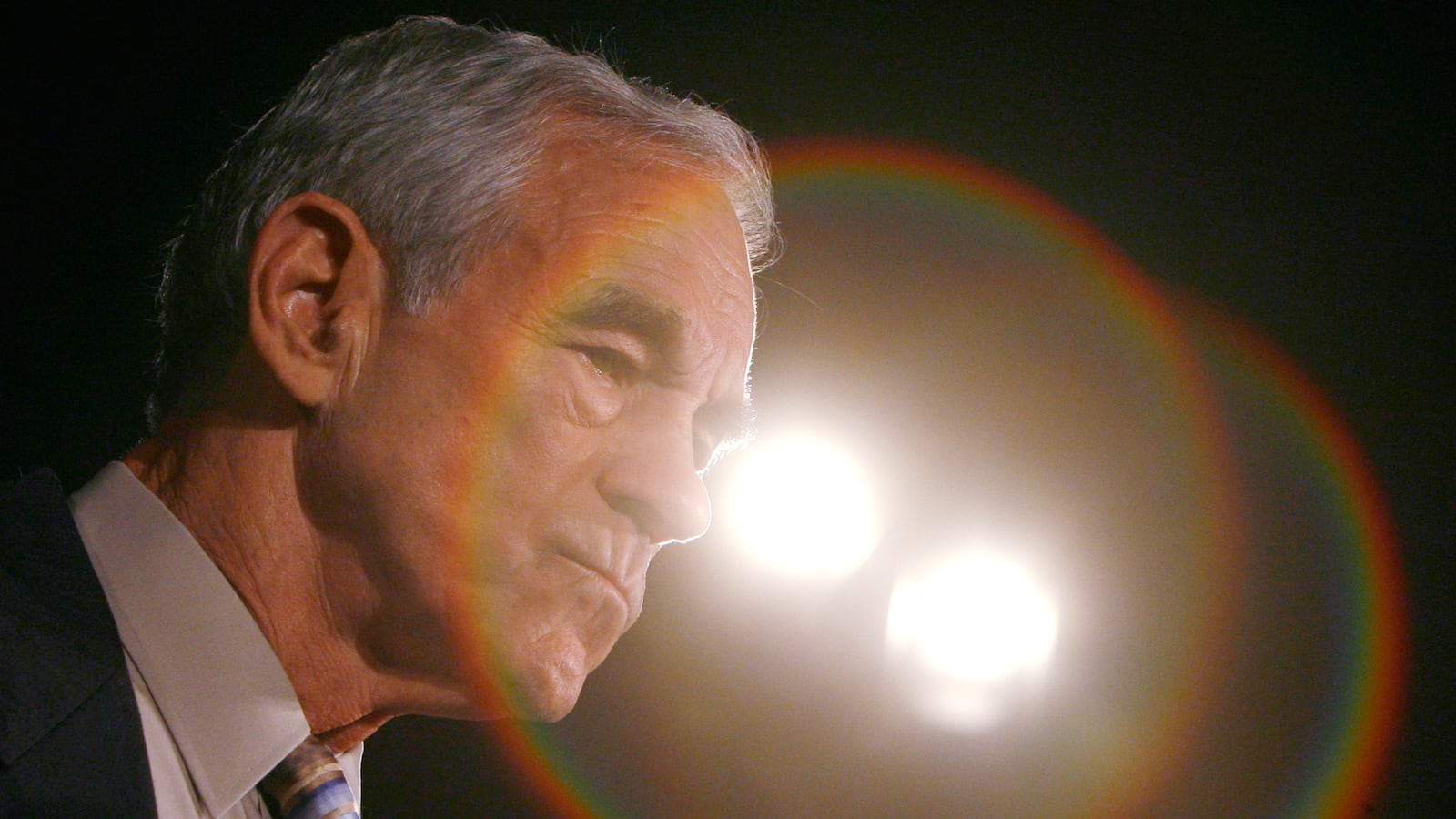Ron Paul does not approve of his son Rand Paul’s position on the Iran deal, and he let him know Thursday evening in a speech that called him out—though not by name.
“Right now one of the big issues, you know, in the news, probably on foreign policy, is whether or not the Obama administration should talk to the Iranians,” the elder Paul told the crowd at the Young Americans for Liberty Conference. “If anybody listened to any of my speeches over the last five or ten years, I advocate diplomacy! A long time before you advocate war!”
Five or ten years ago, Rand did, too.
In 2007, when he was campaigning for his dad’s presidential campaign, Rand was vocally skeptical not just of the idea that the Iranians could obtain a nuclear weapon but also of the notion that if they were to, it would present much of a threat to the United States. “If you look at it, intellectually look at the evidence…Iran is not a threat,” he told radio host Alex Jones. “It’s ridiculous to think that they’re a threat to our national security.”
Today, presidential candidate Rand Paul takes a very different position—one completely at odds with his father’s.
In response to the agreement reached among Iran, the United States, the United Kingdom, France, China, Russia, and Germany, Paul released a statement calling the deal “unacceptable” because “sanctions relief precedes evidence of compliance,” “Iran is left with significant nuclear capacity,” and “it lifts the ban on selling advanced weapons to Iran.”
This is, according to Ron Paul, nonsense.
Last Monday, the elder Paul wrote a column for the Ron Paul Institute that characterized the deal as “one of the two most important achievements of an otherwise pretty dismal Obama presidency.” On Thursday, he explained why he believes those who disagree with him—flesh and blood or not—are dead wrong.
Opponents of diplomacy with Iran, Paul told the crowd, say, “Oh, they’re bad people. There’s a bunch of nutty people in Iran, and they say nasty things. Well, if you were in Iran and listened to some of the nasty things our leaders say about them, you probably would understand this a little bit better!” The crowd erupted into applause.
“But my practical argument for this is that the founders actually gave us pretty good advice: We should stay out of entangling alliances and mind our own business and trade with people. But in my lifetime, there were certain episodes that I was very glad our government was willing to talk to other governments that were considered evil and monstrous.”
Drafted into the military in 1962, Paul said, “Do you think I complained when Kennedy called up Khrushchev and said, ‘Hey, maybe there’s a better way? You take your weapons out of Cuba and I’ll take ’em out of Turkey,’ and the thing was over. So I would say that diplomatic conversation was very beneficial. So, to say that the Iranians aren’t perfect people and we shouldn’t talk to them? You know, we have been so obsessed, for probably 30 years, on the emergency of a nuclear weapon next week, next month, or next year—on a weapon that doesn’t exist. The Soviets had 30,000 of them, and then they’d come back to us and say that we’re a bunch of kooks for wanting to talk to these bad people? I would say that the advice is that friendship is a wise idea.”
When the younger Paul first began testing the waters for a presidential run, in spring 2014, one of his pseudo-campaign’s central priorities, it seemed, was to dispel the notion that he was his father’s clone. The emancipation is now complete, but the effect has been catastrophic for his presidential ambitions. Being a watered-down version of Ron Paul, the evidence suggests, doesn’t make Rand Paul more appealing to other factions of the GOP his dad couldn’t reach—it just makes him less appealing to his natural base of supporters.
No one can know what goes on within a family, of course. But the elder Paul seemed to be sending a message to his son during his hourlong remarks.
At another point in the speech, he noted that in the presidential race, “There’s two individuals right now who have sort of caught the attention: Trump and Sanders.”
His son, who is polling at 6 percent—behind not just Trump but Ben Carson and Mike Huckabee—did not receive a mention.
Update: Doug Stafford, a senior adviser for the campaign, sent me an email taking issue with the “premise” of this story. He included a statement which does not contradict the premise of this story at all, but I’m including it here nevertheless: “Being against a bad deal that is the product of bad diplomacy does not make one against diplomacy. In fact, Senator Paul has stated before, during and after these negotiations that he favors diplomacy and negotiations. He still favors them. He would leave the current interim deal in place and keep going as he has said publicly several times. He also believes in negotiating from strength as Reagan did, and believes this administration has failed to do that and came up with a deal that doesn’t work.”






